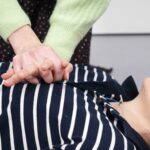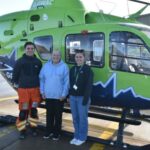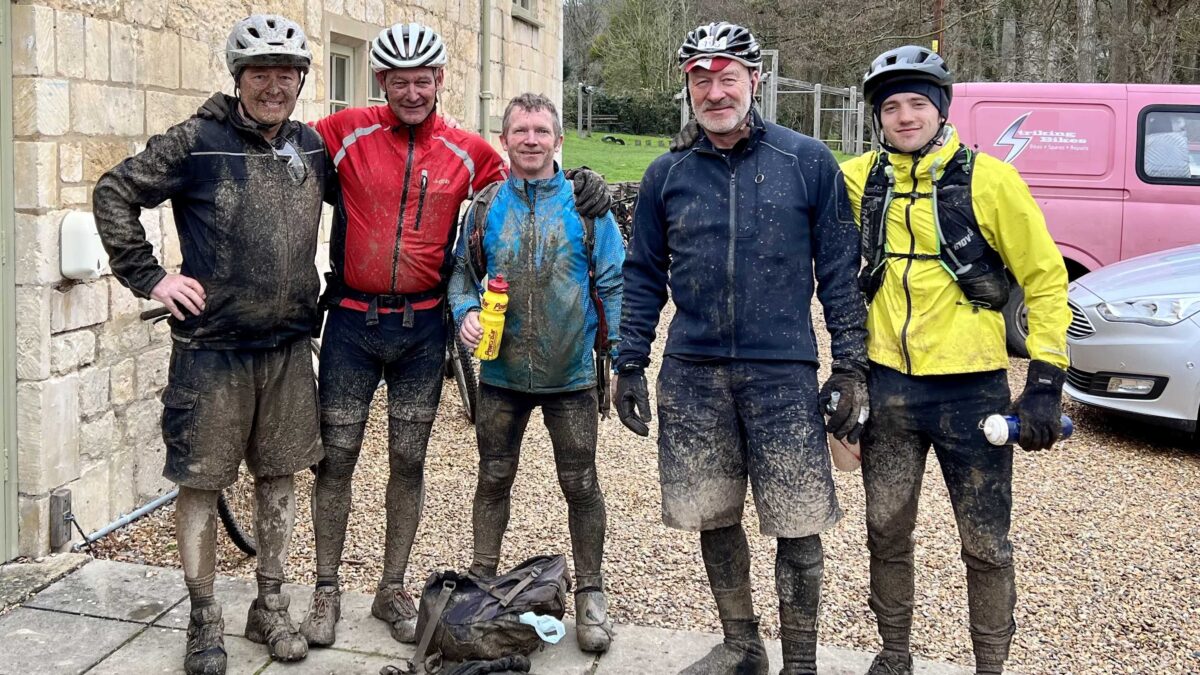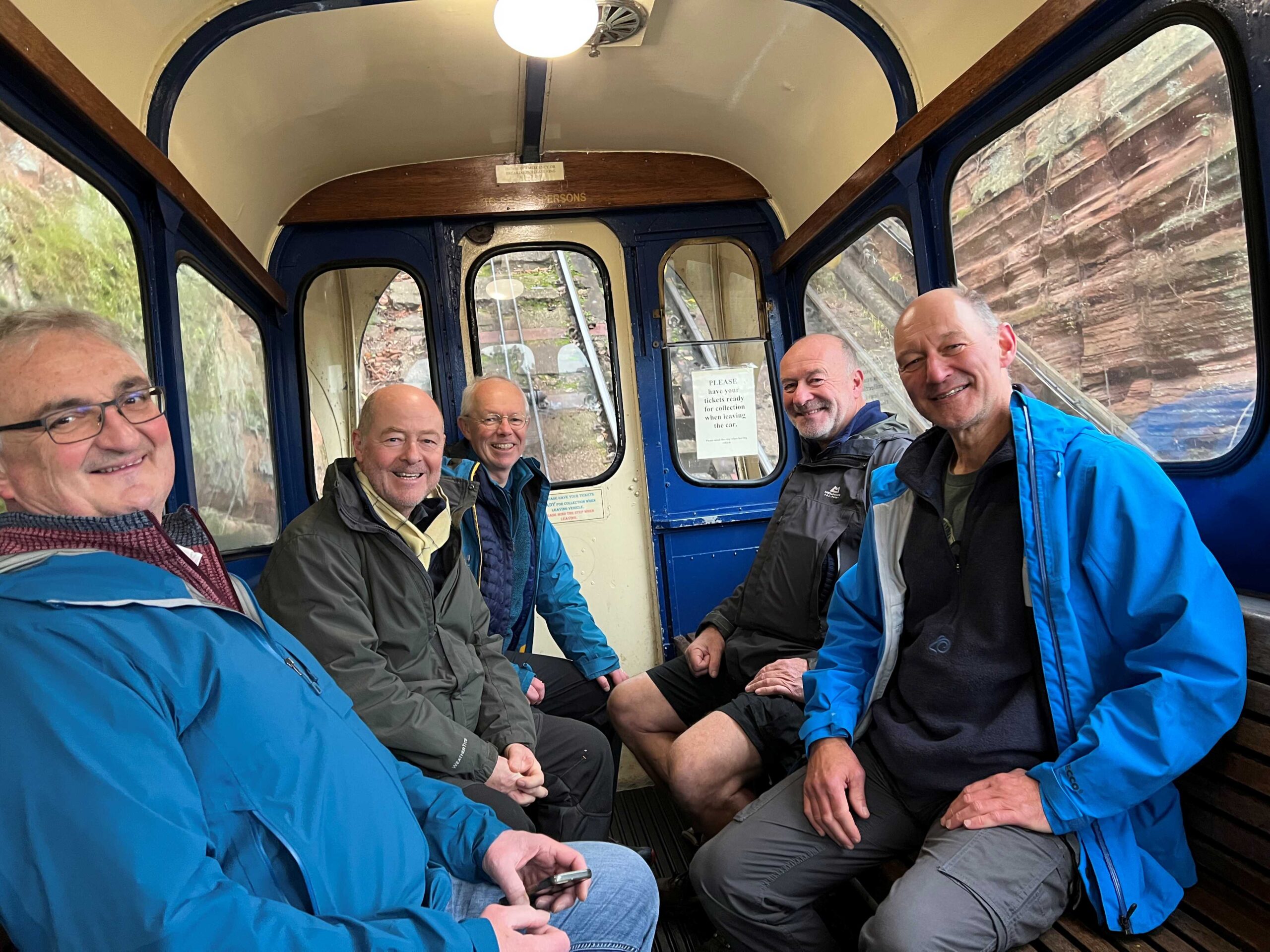
Seven hearts still beating: How communities save lives with CPR and defibs
October 15, 2025
Pam’s Story
October 17, 2025On 14 November 2024 Mark Moran set out on a social bike ride in the Cotswolds with close friends Steve and Dave, but they never reached their destination. 10km into their ride, Mark had a sudden cardiac arrest.
Thanks to the quick actions of Steve and Dave, and the combined skills of a Community Volunteer First Responder, Paramedics, the Critical Care Team from Great Western Air Ambulance Charity (GWAAC), and ongoing treatment in hospital, Mark is fit and well. He survived because he received every part of the chain of survival.
Mark is not someone you would imagine having a cardiac arrest. He runs a company called Hydrate for Health, is a keen cyclist and regularly takes part in triathlons and extreme adventure races.
But on this November day, on an easy social ride to a favourite pub, Mark found himself in need of urgent critical care: “I remember feeling weird, dizzy and breathless and I knew I needed to take my feet out of the pedal clips so I could stop. Then I keeled over. It was like a block of flats losing electricity—like all the lights going off from the ground floor up. It happened so quickly, there wasn’t much time to process it, but I had that feeling that this was it.”
12:27 An urgent call to 999
Steve recalls, “Dave was slightly ahead taking photos because it was a nice day. I heard a grunt from Mark so I turned around and I saw him hit the ground. At first, I thought he was messing around but then I quickly realised he wasn’t. There was nothing—no response, no breathing. I thought he was dead”
With no first aid training since he was 19-years-old, Steve desperately tried to remember the Stayin’ Alive television advert from years ago starring footballer Vinnie Jones. He said, “I started to do chest compressions to the beat from the Bee Gees song Stayin’ Alive and I dialled 999. In that time of extreme worry, shock and concern, the call handler was clear and calm giving me instructions. She counted the beats for me and I was relieved to know I’d been keeping the right time. I didn’t know where we were, so I used what3words to give our location.”
When Dave cycled back to see where they were, he couldn’t believe what he saw: “I found Steve doing CPR (Cardio Pulmonary Resuscitation) on Mark. I tilted Mark’s chin back to make sure he had a clear airway while Steve carried on. I monitored Mark’s colour and I asked Steve if he wanted to swap but he was happy to carry on. Within ten minutes, a Community Volunteer First Responder from South Western Ambulance Service Trust (SWASfT) was with us. We were so relieved because Mark was just showing signs of fitting and gritting his teeth.”
12:37 Community Volunteer First Responder arrives on scene
Pete Bishop combines his day job in IT with his role as a Community Volunteer First Responder for SWASfT. He reflects on the day he helped Mark:
“I was working from home in Tetbury, Gloucestershire when I received a call to attend Mark’s incident. I reached the scene quickly thanks to the what3words location that Steve had provided.
When I arrived, I saw Steve doing really good CPR and Dave was helping keep his airway clear. I did a patient assessment and applied the defibrillator pads. The defib analysed Mark’s heart rhythm and said, ‘shock advised.’ I administered the shock and continued with CPR.
Dave helped me get further equipment out of my car and I prepared the oxygen ready for administration. The defib analysed again and advised another shock. Following that, I did a pulse check and reassessed Mark to find that he was breathing.
Ambulance crews soon arrived and another member of the public also came to help. When the Critical Care Team from GWAAC arrived, I provided a handover of Mark’s care and everyone worked together on scene to help Mark.”
12:51 GWAAC Team provide next step in Mark’s lifesaving care
When the call came in, Critical Care Doctor Paddy Morgan, Specialist Paramedics in Critical Care (SPCC’s) Christian Wiggin and Waldo Zweep, and Pilot Rich MacLaughlin immediately scrambled to get airborne.
SPCC Christian provides an insight into the team’s decision making and what they did at the scene to help Mark:
“Because Mark was a relatively young, active person and had collapsed suddenly in front of his friends who immediately started CPR, we knew there was potential for Mark to survive and recover well; our resuscitation skills were likely to be needed.
We quickly located Mark and landed safely in a field nearby. We grabbed our kit and made our way to Mark. As we did so, we took the ‘scene temperature’—we looked at the location, likely causes of injury, activity and stress levels of the people there to interpret what has happened.
We needed to rule out major trauma as a cause and other factors that might have caused a loss of consciousness—had he fallen off his bike and lost consciousness? had he lost consciousness and fallen off his bike?
As we approached, we found people busy helping Mark. There was no sign of panic and it became apparent very quickly that Mark was no longer in cardiac arrest—all good signs! And because we had already discussed the roles we would take, we were ready to treat Mark as efficiently as possible. I was responsible for scene management and communication, Trainee SPCC Waldo would manage Mark and the clinical side of things, and Dr Paddy would support Mark and help oversee the clinical element.
SPCC Waldo assessed Mark to try and identify the likely cause of the cardiac arrest and to see if his blood pressure, heart rate and conscious level were all in normal parameters. I called Control to communicate the status of Mark’s care and discuss the need for additional logistics. We then shared information with each other and discussed an onward plan.”
13:45 GWAAC flies Mark to the Bristol Heart Institute
The GWAAC Team decided to take Mark straight to the Bristol Heart Institute at Bristol Royal Infirmary. Often, they will take the patient to hospital in a land ambulance, travelling with them in case they deteriorate and need to intervene. SPCC Christian says, “It’s quite a tight space inside a helicopter at 2000 feet!” But because Mark was looking stable and was at quite a distance from the cardiology team at the Bristol Royal Infirmary, they loaded him into the helicopter.
Mark remembers, “I woke up while I was being carried on a stretcher across a field to the air ambulance and I was worried about where my car keys were.” Dave said, “He actually came around before this, when he was in the back of the ambulance. He asked to see his two mates, so Steve and I popped into the ambulance and Mark looked up at us with his eyes wide open which was incredible to see, but then he asked me if I had his car keys! I said yes and Mark proceeded to ask me three more times; that was quite a funny moment amongst all the other stuff going on.”
Mark was in hospital for three and a half weeks in total. He says, “The first couple of weeks are a bit of a scramble in terms of what I can remember, but I know I had lots of tests early on to try to identify the cause of my cardiac arrest.”
His consultant was Dr Glyn Thomas, one of GWAAC’s Critical Care Doctors and a leading Cardiologist in the UK. Dr Glyn told Mark, “We’ve done every test and we can’t find a cause.”
Mark had an ICD (Implantable Cardioverter-Defibrillator) fitted as a precaution in case it ever happened again. His top goal in hospital was to get well for his seven-year-old son, Harry. His second goal was to get back to doing the things he loved with his friends.
In a follow-up appointment with Dr Glyn, Mark was pleased to hear that he could start running, biking and canoeing. He said, “Dr Glyn was superb! I set a goal with Dr Glyn that I would do a half marathon; I wanted to raise money for GWAAC.”
Six months after his cardiac arrest, Mark completed the Bristol Half Marathon in May 2025.
Reuniting with the people who helped save his life
On 4 June 2025, GWAAC hosted a reunion for Mark, Steve, Dave, Community Volunteer First Responder Pete and some of the Critical Care Team from GWAAC. It was a chance for the three friends to learn more about what happened that day and for Mark to thank everyone for the vital roles they played in saving his life. It was an emotional day for all. Mark said, “I knew it would be, but it’s been very positive and I embrace it. It is a lovely close of the circle and I really do see it as that.”
He says, “I’m only just realising how all these different parts and emergency services are fitting together and how vital they all are. It has astounded me to learn how big the chain is that needs to keep someone alive. It reinforces the need for speed in terms of doing chest pumps and getting blood to the brain, and treatment. I received a series of miracles that day in the form of some wonderful people and the skills they brought.”
SPCC Christian said, “Mark’s outcome is the result of great team success. I’d say the real heroes of this story are Mark’s friends who performed such good CPR and then Pete who arrived so quickly with the defibrillator. It was a privilege to be part of the Critical Care Team involved in helping to stabilise Mark and get him so quickly to the cardiac specialist centre. I am delighted at how well Mark has done!”
Mark’s message: “Learn CPR!”
Mark now volunteers for GWAAC in his spare time encouraging people to learn CPR and find out where their nearest defibrillator is:
“I would recommend that everyone learns CPR—you’ll have the potential to save a life. I know I wouldn’t be here today if it wasn’t for Steve starting CPR straight away and the actions of everyone else who came to my aid.
I realise how lucky I’ve been—I have no brain or memory problems, and I can honestly say this is beyond a lifechanging experience. I was gone. I’ve realised that life is fleeting and I have a new appreciation for that.”
Steve and Dave say, “We are both so thankful to have our friend back. The only difference we can see in Mark is that work and everyday worries don’t get to him so much. He doesn’t even moan about politics!”
The three friends have since completed the bike ride they started on that November day, finally making it to the pub and celebrating with a bowl of chips.

I started to do chest compressions to the beat from the Bee Gees song Stayin’ Alive and I dialled 999. In that time of extreme worry, shock and concern, the call handler was clear and calm giving me instructions. She counted the beats for me and I was relieved to know I’d been keeping the right time. I didn’t know where we were, so I used what3words to give our location.
When I arrived, I saw Steve doing really good CPR and Dave was helping keep his airway clear. I did a patient assessment and applied the defibrillator pads. The defib analysed Mark’s heart rhythm and said, ‘shock advised.’ I administered the shock and continued with CPR.
Dave helped me get further equipment out of my car and I prepared the oxygen ready for administration. The defib analysed again and advised another shock. Following that, I did a pulse check and reassessed Mark to find that he was breathing.
Mark’s outcome is the result of great team success. I’d say the real heroes of this story are Mark’s friends who performed such good CPR and then Pete who arrived so quickly with the defibrillator. It was a privilege to be part of the Critical Care Team involved in helping to stabilise Mark and get him so quickly to the cardiac specialist centre. I am delighted at how well Mark has done!
I would recommend that everyone learns CPR—you’ll have the potential to save a life. I know I wouldn’t be here today if it wasn’t for Steve starting CPR straight away and the actions of everyone else who came to my aid.
I realise how lucky I’ve been—I have no brain or memory problems, and I can honestly say this is beyond a lifechanging experience. I was gone. I’ve realised that life is fleeting and I have a new appreciation for that.







